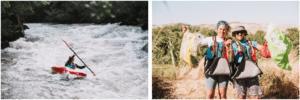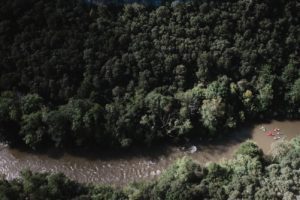BLUEBRO Project: Kayaking Adventure for Environmental Conservation
©BLUREBRO project
Kayaking almost 1000 km of the longest river in Spain, the Ebro, in order to highlight the environmental problems of such an important ecosystem as well as to raise awareness about sustainable and respectful practices towards nature in our daily lives. Read a testimony from the BLUEBRO project, written by its youngest team member and former intern at EUROPARC, Alberto Robles.
Bluebro: An adventure at the service of sustainability
A team of four kayakers (plus another four support members outside water) have crossed 7 Spanish regions during 24 stages, 930km in total, in order to raise awareness of the importance of water as an indispensable resource for our life, health, biodiversity and agriculture.
Through this epic challenge of a cross-cutting and multi-generational nature, the aim is to draw the attention of each and every individual in society who needs and uses the water resources of rivers on a daily basis. The metaphor of the river’s course and its life cycle has been used to make a comparison with human beings and their demands in terms of natural resources to develop any type of economic activity.

©BLUREBRO project
Alberto Robles, the youngest of the team members (24) and former intern at EUROPARC Federation, explains how he has perceived this experience from the water and the learning about such important issues as pollution, plastics in the river, water uses, sediments, recreational uses:
”According to the testimonies of the actors that we have met along the way (organizations, politicians, businessmen, farmers, fishermen, biologists…), the situation of the river shows an improvement tendency in the last 10 years due to the environmental protection actions that have been carried out. This is the positive side of the story and the basis that will help to continue evolving towards a sustainable future, but today it must be made clear that it is still insufficient and that our consumption of natural resources is still generating a deficit.”
Witnessing the reality of the earth’s ecosystems
The change of perspective is one of the crucial points of the project: ”When you cross 930km through water, going into forests and all kinds of landscapes, you understand better what we are doing to the planet”.
This is where a factor that can be considered a risk for environmental protection, such as Outdoor Sports, becomes a tool at the service of nature: ”from our kayak we have been able to witness first hand what happens to nature, and then report it and communicate it to the society.”

©BLUREBRO project
Spreading the message
Communication is one of the central objectives of the project: ”In the end we are just telling a story, about the relationship of humans with nature and, in this case, with water.”
It’s all about connecting with the emotions transmitted by outdoor sports to deliver a message of environmental conservation.
With this objective, in addition to communication on media and social networks, the participants will present a documentary during the year 2021 in which they tell us about their adventure.
The project and Protected Areas
The change in the landscape and conditions of different regions or even local areas can be identified very well along the route, within which the Protected Areas should be highlighted, as they show a clear positive difference in terms of nature management, which is the first visual indicator that the work is being carried out properly.
Among the Protected Areas we have passed through, such as the important natural parks of Hoces del Ebro and Delta del Ebro, we have had the privilege of talking to some of the protagonists of their development, who made us understand the problems these hot spots face:
- Obstacles in the path of the water / Ecological alteration (dams and transfers): problems of sediments, nutrients and management of aquifers.
- Pollution: plastics and waste of different origins, intensive agriculture (fertilizers), and intensive livestock farming (slurry).
- Abuse in the use of water: excessive use implies transfers that alter all natural cycles while creating serious problems in the main river.
- Invasive species: one of the main problems (zebra mussel or apple snail) and a direct consequence of the above-mentioned disturbances and problems.
- Climate change: reduction of rainfall, which globally means a 1% loss of water abstraction in the river basins of Spain (20% less water availability in 2050).
Visit the official website of the project to find out about the in-depth adventure as well as the environmental reflections and calls for action!